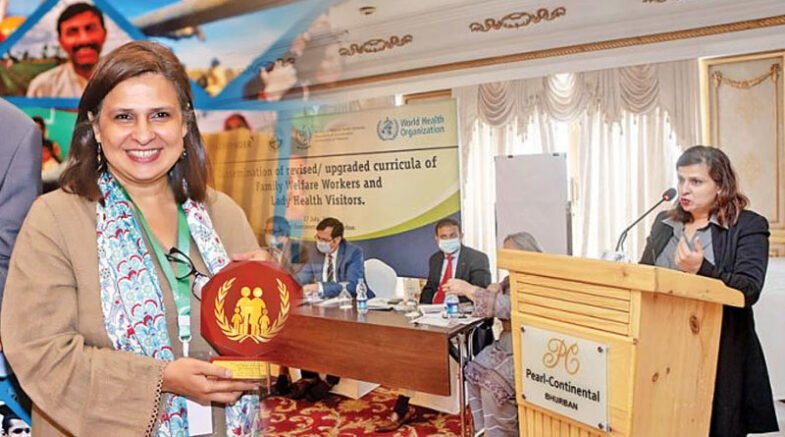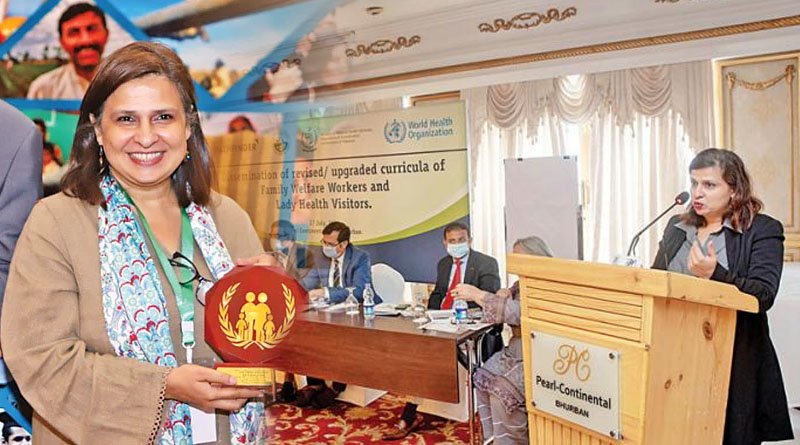The Heroines of Health Awards were founded in 2017 to provide a platform for women’s contributions to health, which are enormous but often go unnoticed.

Dr. Tabinda Sarosh was named a “Heroine of Health 2022” by Women in Global Health, a prestigious award. The Heroines of Health Awards were founded in 2017 to provide a platform for women’s contributions to health, which are enormous but often go unnoticed.
She is a physician and public health practitioner. She has developed and implemented numerous reproductive health programmes at the national, regional, and global levels in both private and public health systems.
Dr. Tabinda Sarosh has been Pathfinder’s country director in Pakistan since 2016, and she currently serves on the organization’s Global Leadership Council. She is a clinically trained and experienced public health practitioner in sexual and reproductive health and rights (SRHR), with extensive experience leading SRHR programmes and research in the development and humanitarian sectors.
Tabinda Sarosh is also the Project Director for “Naya Qadam,” a Pathfinder initiative that takes a systems-building approach to increasing women and girls’ access to high-quality post-pregnancy family planning and counselling public and private health services.
Dr. Sarosh was in charge of women’s health programmes in 118 Aga Khan Development Network centres in 2005. At the same time, she became a member of the feminist organisation Shirkat Gah. She oversaw reproductive health programmes as well as business development and community engagement. Dr. Sarosh worked to amplify women’s voices in community-based groups, later bringing them to larger forums for national representation.
She worked to achieve the Beijing Platform’s, the International Conference on Population and Development’s, and the Convention on the Elimination of All Forms of Discrimination Against Women’s goals.
Dr. Tabinda Sarosh graduated from Dow Medical College in Pakistan with a BS in medicine and surgery and a postgraduate diploma in nutrition. She is also a certified gender-based violence capacity development promoter and alumna of the University of Leiden’s summer school on women, peace, and security.
Dr. Sarosh worked on policy issues concurrently, which resulted in the collective achievement of raising the marriage age to 18. in an exclusive interview with you this week! Dr. Sarosh tells us about her incredible journey.
You! You are a doctor, so how did you begin working on women’s rights?
It started with my birthday. I was born on March 8 – Women’s International Day – the year was 1975, the first year declared by the UN to be the women’s international year. While I was growing up, I spent almost all my birthdays at a women’s rights seminar or a women’s walk – courtesy my mother who was a journalist and was associated with the Women’s Action Forum (WAF). Even now sometimes on my birthday, I am at ‘Aurat March’. I grew up in a literary environment by two strong journalists (my father was also a journalist), so becoming an advocate of women’s right was a natural choice.
You! How was your experience at women’s health department at Aga Khan and Shirkat Gah?
DTS: I joined Aga Khan Health Resources and it was the Women’s Health department in 2005. They were running primary care health centres and that was, I think, my first interaction with the primary care system. I got to learn a lot about ground realities and was able to interact with communities.
Shirkat Gah was run by women, committed feminists of Pakistan who were all members of the Women Action Forum. I joined Shirkat Gah as I had shown interest in women’s health. I managed the reproductive health department and that’s where it started. Research was a big part of my work. My team at Shirkat Gah were responsible for generating on-the-ground data about the social and economic status of those in early marriage. I was lucky to have worked with icons like Khawar (Mumtaz) and Farida Shaheed while I was there.
You! Can you shed light on some of your projects?
DTS: My first project was around gender-based violence in areas affected by 2010 floods. We were tasked with developing women-friendly spaces where women and girls could gather during a humanitarian crisis where they would be safe. We set up six spaces including Swat, Shahdadkot Muzzafargar and Bakkar. One part of the work we did was preventing unsafe abortions and educated local women about that. What happens is that rural women end up in unsafe places where the case will be messed up to the extent of subsequent infertility, infection, bleeding and the incontinence of urine. So that was a part of the work.
I also did shadow reporting on Convention on the Elimination of all Forms of Discrimination Against Women (CEDAW) which is taking part in the CSW (Commission on the Status of Women). I was also a part of the reporting process of International Conference on Population and Development (ICPD) – tracking government’s progress towards MDG5 A and B which were specific women’s reproductive health indicators. Then I did a small one-year stint in Malaysia with a regional women’s organisation called Arrow (Asian-Pacific Resource & Research Centre for Women).
You! Do you enjoy your work as Pathfinder’s President, South Asia, Middle East, and North Africa?
DTS: Through Pathfinder, I am able to channel my experience as an activist, and transform it into concrete, evidence-based systems strengthening efforts. At the same time, I can continue my activism through policy and advocacy work. It’s a journey that holds a promise of sustainability and scale, and I am genuinely proud of the work I do.
The organisation has been the paradigm shift for me. It works systematically for example, if you can solve an issue today, you can continue into the future. The organisation continues the advocacy into the future for more progressive reforms.
You! How do you feel about receiving the ‘Heroine of Health Award – 2022’?
DTS: The award is given by women in global health – this is an organisation that is kind of looking into what the journeys have been of women in global health. I feel proud that I have received this prestigious award in recognition of my services.
You! Your work includes projects to spread awareness about sexual reproductive rights. How do you work on this sensitive issue?
DTS: When people hear the word ‘sex’ it has different meaning but when we (doctors) hear it, it has a completely different meaning. When we talk about these rights, we are talking about rape victims, gender-based violence, HIV etc.
It all depends on your approach. If it’s a women-friendly space then your approach is different. But I guess, women are actually not the problem. They’re the ones who are at the receiving end of. It’s men we need to be talking to. It’s heartening to see there are men who are aware and are willing to get engaged in the dialogue.
Pathfinder works with the government, the government’s partners and they have their own SOPs but what is the government’s SOP, it starts from the constitutional laws, so we work on advocacy but at the same time looking at women’s health as a rights issue is very important. Pakistan actually has progressive laws and policies if you compare to some countries in the region so our standardisation to the age of 18 is progressive, but it’s around implementation that the problem comes. Pathfinder is making that pathway for women easier. Our work is very important as it is about strengthening the systems.
Originally published at The News
